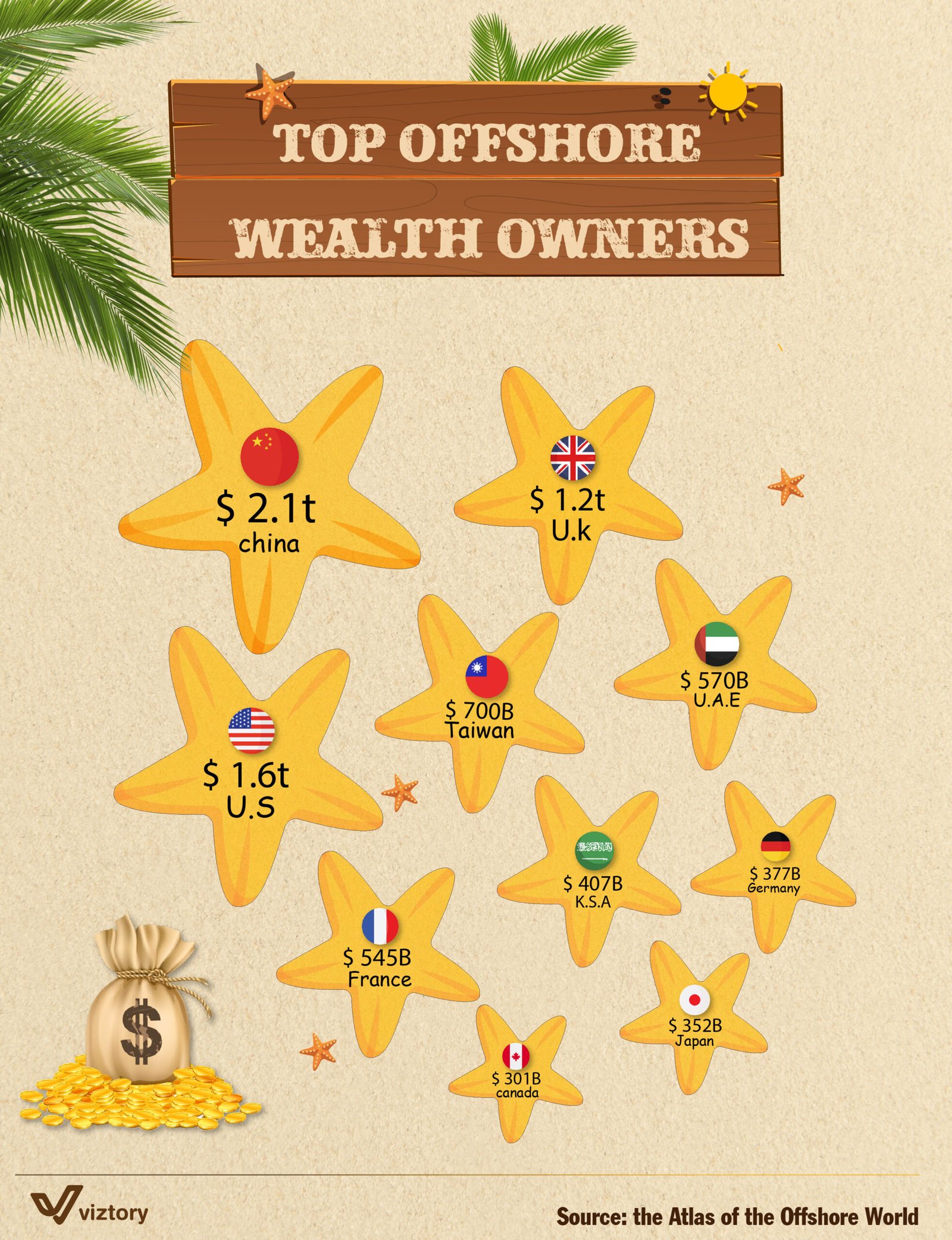Top Offshore Wealth Owners: The Hidden Financial Giants
-
Oct, Fri, 2024
Top Offshore Wealth Owners: The Hidden Financial Giants
The visual representation of the top offshore wealth owners in 2024 reveals an astonishing picture of global wealth distribution. With China leading the pack at $2.1 trillion, followed by the U.S. at $1.6 trillion and the U.K. at $1.2 trillion, the data provides insight into the growing use of offshore financial hubs by the world’s wealthiest individuals and corporations. These massive sums of money stored offshore raise important questions about global financial inequality, tax avoidance, and the impact of hidden wealth on economies worldwide.
The Rise of Offshore Wealth
Offshore wealth refers to financial assets held in foreign jurisdictions, typically in countries or regions known for favorable tax laws and financial secrecy. These assets include bank accounts, investments, and properties, often held to minimize tax liability, avoid regulations, or protect privacy. As the visualization shows, some of the world’s largest economies are also the biggest holders of offshore wealth, indicating the widespread use of offshore financial centers by both individuals and corporations.
China’s staggering $2.1 trillion in offshore wealth is a clear example of how globalization and the liberalization of financial markets have allowed wealthy Chinese individuals and companies to move large sums of money offshore. With stringent domestic regulations and high tax rates, many of China’s elite have found it advantageous to park their wealth in offshore financial hubs to maximize returns and protect their assets from government oversight.
The Role of Money in Offshore Havens
Money is the driving force behind the offshore wealth industry. Wealthy individuals and corporations use offshore havens to grow their wealth by taking advantage of tax-friendly regulations. By placing their assets in jurisdictions like the Cayman Islands, Switzerland, or Singapore, they can legally reduce their tax obligations. However, this system also contributes to wealth inequality and limits the revenue available for governments to invest in public services such as healthcare, education, and infrastructure.
For example, the U.S., with $1.6 trillion in offshore wealth, sees many of its largest corporations and wealthiest individuals using these havens to avoid the higher corporate and personal tax rates back home. While legal, this practice reduces the tax base and places a heavier burden on the middle and lower classes, who cannot access the same financial loopholes.
The U.K. and Europe’s Offshore Wealth
The United Kingdom, with $1.2 trillion in offshore wealth, has long been a key player in the global offshore finance industry. London serves as a hub for global finance, while the U.K.’s network of overseas territories, including the British Virgin Islands and Bermuda, plays a significant role in facilitating offshore wealth management. Many of the world’s elite use these jurisdictions to shield their wealth from public scrutiny.
Other European countries, such as France ($545 billion) and Germany ($377 billion), also have significant amounts of wealth stored offshore. These countries have faced increasing pressure from both the public and international organizations to crack down on tax avoidance and improve financial transparency. However, the high levels of offshore wealth highlight the challenges in regulating this opaque industry.
Offshore Wealth and Emerging Markets
Interestingly, emerging markets like Taiwan ($700 billion), the United Arab Emirates ($570 billion), and Saudi Arabia ($407 billion) also feature prominently on the list. In these nations, rapid economic growth and wealth accumulation have driven individuals and corporations to seek offshore financial havens as a way to protect and grow their wealth outside the constraints of domestic regulations.
For countries like the UAE and Saudi Arabia, known for their oil wealth and influential elites, offshore investments help diversify their financial holdings and protect against potential economic downturns. In these cases, offshore wealth is not just about tax avoidance but also about global financial strategy.
The Implications for Global Wealth Inequality
The widespread use of offshore wealth management systems has profound implications for global wealth inequality. As the world’s richest individuals and corporations continue to move their money offshore, the wealth gap between the rich and the rest of the population grows wider. Offshore wealth allows the wealthy to protect their money from taxation and regulation, further concentrating wealth in the hands of a few while reducing the resources available for social welfare programs.
The hidden nature of offshore wealth also makes it difficult for governments to accurately assess the financial status of their economies. With trillions of dollars kept offshore, countries are missing out on vital tax revenues that could be used to invest in healthcare, infrastructure, and education. This dynamic contributes to ongoing social and economic challenges, particularly in countries where wealth inequality is already high.
The Future of Offshore Wealth
As international pressure mounts to address tax avoidance and financial secrecy, many countries are introducing new regulations and agreements aimed at curbing the use of offshore tax havens. The OECD’s Common Reporting Standard (CRS) and the U.S. Foreign Account Tax Compliance Act (FATCA) are examples of efforts to increase financial transparency and force individuals and corporations to declare their offshore assets.
However, the vast amounts of money stored offshore, as highlighted in the visualization, show that there is still a long way to go. For countries like China, the U.S., and the U.K., finding a balance between maintaining their status as global financial centers and addressing the negative effects of offshore wealth will be a key challenge in the years to come.
Conclusion
The top offshore wealth owners in 2024, led by China, the U.S., and the U.K., reflect the growing trend of individuals and corporations using offshore financial systems to manage and grow their wealth. While these financial strategies are legal, they raise critical questions about global wealth inequality, tax avoidance, and the impact of hidden wealth on national economies. As governments work to increase financial transparency and close tax loopholes, the global offshore wealth industry will likely continue to evolve, shaping the future of global finance and wealth distribution.

